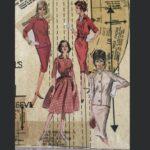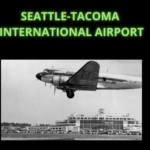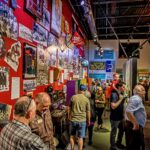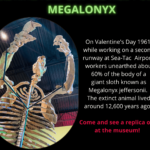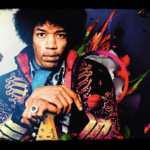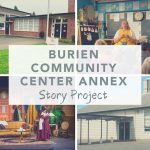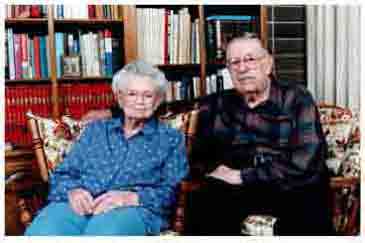May 3, 1995 • Interviewed by Darlene Bode
 Mr. Yeakel, You told me that the reason you came to Burien was to establish a fox farm. Would you pleases tell me about that?
Mr. Yeakel, You told me that the reason you came to Burien was to establish a fox farm. Would you pleases tell me about that?
For a number of years my father and I had operated a fox farm in Idaho. We sold our pelts through the Seattle Fur Exchange on an auction. We discovered that the pelts from foxes that we raised under cover or in the shade during the latter part of the summer and in the fall had a much better color and brought more money than those that were raised in the sun. So we built a shed on our farm in Idaho.
In the summer we put the foxes that we intended to pelt into this shed to keep the sun from beating down on those foxes that we were going to pelt. The sun seemed to take the oil out of the pelts and they lost the luster and the sheen that they would keep when they were in the shade. I struggled to find a new farm that was in the shade of the trees, feeling that if they could be raised in the shelter of trees it would have the same effect as the shed had.
So after awhile after discussing it with people in the Seattle Fur Exchange and with people we had met around the auction I located a man who lived in the Seattle area. He said that in the area between Seattle and Tacoma on Redondo road there was a fox farm. And the owner also had a vacant farm in the Burien area and I might be able to make some kind of deal with him. So eventually I got in touch with Mr. Theme (Thorne?), who was a very fine gentleman, a little younger than my father who had a nice fox farm.
I discussed the possibility of leasing the place that he had which was located just one block north of the Highline High School. This was an interesting conversation. I found out that the place had been run by two bachelors who had a very fine fox farm and they felt that they were being quite successful. They went into the stock market playing the wheat market on a margin. They thought they were making profit, so they sat down to figure out how much they were making and they decided that they should go in the next morning and sell the wheat and take their profit and forget it. So the next morning early they started into town. By the time they got into town the market had dropped and they had been sold out so they lost everything that they had. This was about 1932.
I don’t know whether Mr. Theme (Thorne?) had taken a loan or not, but anyway he bought the farm from these two fellows, lock, stock and barrel. He bought the ranch, cashed them out entirely, took the foxes down to his place, so the ranch was sitting there empty.
It was a beautiful farm, nice pens, not much of a house. There was feed house with living quarters in it, a goat house, a couple of chickens. They used to chop wood on the floor, but anyway it was living quarters. We made a deal with him for a certain length of time, with an option to buy it, and then we moved in some foxes. This was late in the summer of 1934.
To give you some idea of the house: we had to walk several steps to the back house, the house had no toilet, no inside plumbing. My wife used to wash down the floor with a hose and let the water rundown through the knotholes. We got by. It had an old feed house, not very luxurious. But anyway the first year we made it do. After a year or two we decided that eventually we would buy it. So we talked to Mr. Thorne and decided to make a few changes to remodel it. That’s why we came to Burien…to have a place to raise foxes under the fir trees.
Well, we worked with the foxes until the war came on. When World War II came on I went to work for Pacific Car and Foundry. They gave me the job of superintendent of the tank division and I worked for them in charge of the accounts payable department until pretty close to the end of the war. I became very well acquainted with the man in the personnel department. We used to have lunch together and we would discuss what we were going to do when the war was over. In the meantime, I had put a few of the foxes around on different farms because there were too many of them for my wife to take car of herself. So when I left the foundry, he left soon afterwards.
We bought the soft ice-cream machines that Walter Clark had at, I think it was called, the Port of Embarkation which was closing out in Seattle. With these machines he had a large ice-cream quota mix that was designated for the Port of Embarkation. Ice-cream mix was hard to get in those days, same as butter, bacon, ham and many other things. So we took this mix and gave it to Hans Forrester who was the cheese and butter maker for Alpine Dairy. We asked him if he could make some kind of concoction with that to give us a larger volume, that would similar to a soft ice-cream.
So we were very successful in that regard. He gave us many times the volume with that mix. So we bought more machines from the Mills Company who made them. The man who went in with me from the foundry, Clark Benton, we build a number of stores in other districts. The first store we had was at the Bush Hotel on Jackson Street. The first two or three days we operated we gave it away so people would know we were there. Then we put up a store in Renton Highlands, and one in West Seattle. We had plenty of machines and plenty of mix.
We were doing quite well, and then for various reasons we decided to sell the place on Jackson Street. We put it up for sale and it sold within 24 hours. We decided that was a pretty good thing to do. So we added a couple of thousand dollars to the price of the next one and in a week or ten days we sold it. We went on doing that we were selling through a real estate office in town, State Realty. Finally they asked me why I didn’t come to work for them.. That idea appealed to me so I went to work for State Realty selling small delicatessens and things of that kind. If I found a little place with a soft ice-cream machine in it, I would buy it or take an option on it and find another buyer for it and eventually sell it at a profit. Anyway I was doing real well at it.
At that time you didn’t have to have a salesman’s license to sell business opportunities. We had a business chance broker’s license. We had to have a license from the bunco squad. But there was a fellow there by the name of Jack Gordon who was working there too. So Jack and I decided we would take the course as a salesman Edison Vocational School so we could sell real estate. Eventually we got our broker’s licenses. So then Jack and I left the State Realty and opened up an office for ourselves right around the corner from where we had been working. Jack and I operated the Sound Realty and Investment Co. for a year or two. Then Jack’s son and my son got out of the service and Jack and I decided to split up. So we set a price on it and I sold out to Jack.
So I opened an office in Burien on the 17th of March in 1949. My son bob and I opened on 12nd in Old Burien. At that time locations were hard to find. Perry West had a building on Des Moines Way. He was just finishing his building on 152nd. I made a deal with Perry to get his place on 152nd which was just east of the feed store. I paid Perry $1,000 to take over that spot. As soon as his new building was finished I moved in.
At that time Burien was pretty much just small homes surrounded by three or four businesses. On the north corner of 152nd on the east side of Ambaum was a coal and wood business known as Bunge Lumber and Fuel. On the south side where Key Bank is now was a blacksmith shop. Then there was a dry goods store and a little grocery store on the west side of Ambaum. The street car tracks were still at the intersection; the street cars were no longer running but the tracks were still there. We used to buy eggs from the Ironsides family where SeaFirst Bank is now. There was very little business in Burien.
So one of the first places that opened up when we first came to Burien was when Monte Bean came to us and said he wanted to open up a Tradewell store. He told us what he wanted and where he wanted to have it, gave us all the details. It required that we would have to sell him about seven pieces of property on the north side of 152nd, so we proceeded to tie up those seven pieces, each provided that we could get the other six. We were successful in getting the property, subject to it being rezoned. They took it to the planning commission and the planning commission turned it down. Tradewell gave it to their attorneys, Bogle and Gates, and sued the county, and they won the suit. Then they had to rezone it. So then my son and I made an application to the planning commission that they zone (for business) all the property on the north side of 152nd all the way to First Avenue South. And we were successful in getting it zoned.
Then people wanted to have a business of some kind. And there were no stores of any kind just little houses. So if somebody came in and wanted a business they had to wait for us to sell somebody’s property and wait for the building to be built. Then we decided to try to rezone the south side of 152nd, and w got that zoned. So business started to grow. We were successful in getting listings on a good share of it. People who wanted to go into business were willing to wait for a building to be built.
We attempted to zone 153rd. We were turned down for three years, but eventually got it zoned. Then property that had been worth $2,000 or $3,000 became worth $50,000. At one time there were 135 people who had gone down to protest the zoning. But after it was passed those people were happy to have me sell their property for $50,000 instead of two or three thousand.
Who were some of the contractors who did the building?
They were local builders. There was Clarence Wise, Roy Owens, Don Pomeroy. They were people they knew and had confidence in, people who could furnish a bond. They were people who were willing to sell their property and take a second mortgage. Back there was a man in a shoe repair shop, Bruno. He wanted to sell a piece of property. We had a buyer that wanted to buy it, with a deed release and take a second mortgage back. The seller didn’t want to do that, but he went to his accountant and his bank and they advised him that it was a good deal. We had a buyer who could put a substantial amount down and had people that wanted to lease it. The payments would be sufficient to take care of his mortgage payments and take care of the building and give him a nice return for a number of years. He finally did it. As long as he lived he would walk across the street and shake my hand and tell me what a nice deal that was. His son just recently retired from his business on the east end of 152nd Street and he still tells me, “Mr. Yeakel, what a nice deal you made for my folks.”
We had a lot of people who would sell their property and take a second mortgage back with a good solid tenant and took a good income for many years. It worked out nice for all of us. A lady owned the place where Angelo’s is now and she sold that property to Joe Feroe. Joe paid her $7500 down. We leased it to the liquor store, a good tenant. She took a second mortgage back. Joe borrowed enough money to pay for the building and to get his $7500 back. So Joe never had a dollar in it and she had an income there for a long time.
One beautiful Sunday morning my wife and I were out driving around. We saw a man out working in his garden. He had a beautiful spot, you could look all around the country. We stopped and inquired if he knew of any places for sale, something similar to his. He pointed over toward Gregory’s house and said it’s just as nice as this at Gregory Heights and Normandy Park, and I think they would be glad to sell something. They needed money. He said the bond holder would be glad to sell it.
So we went to him and asked if we could buy a piece of property at Gregory Heights. I offered him $1,600 for ten acres, and I offered him $200 down. I didn’t hear from him for a long time. Finally I got in touch with him and he said it wasn’t a very good offer. So I asked him what it would take. I wanted to buy ten acres. He said, “I think if you offer $2,000 with $200 down and $20 a month he might make a deal.” So I said I would try it. I gave him $200 and we got the deal squared away. Within three months time a man came and wanted to buy one acre and offered me $1,000 for one acre.






